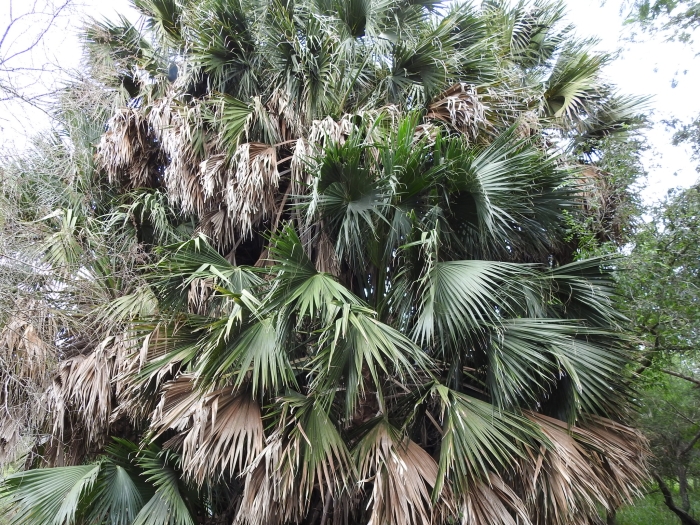Texas Palmetto
(Sabal mexicana)
Texas Palmetto (Sabal mexicana)
/
/

Sam Kieschnick
CC BY 4.0
Image By:
Sam Kieschnick
Recorded By:
Copyright:
CC BY 4.0
Copyright Notice:
Photo by: Sam Kieschnick | License Type: CC BY 4.0 | License URL: http://creativecommons.org/licenses/by/4.0/ | Rights Holder: Sam Kieschnick | Publisher: iNaturalist | Date Created: 2020-11-12T15:06:50-08:00 |






























Estimated Native Range
Summary
Sabal mexicana, commonly known as Texas Palmetto or Rio Grande Palmetto, is an evergreen palm tree native to riverbanks, savannas, and open woodlands in northeastern Mexico, Central America, the Gulf Coast of the United States, and Texas. It can reach a height of 12–18 meters (39–59 feet) with a crown spread of 3–4 meters (9.8–13.1 feet). The trunk is typically 12–15 meters (39–49 feet) tall and 30 cm (12 inches) in diameter, often with a swollen base. The fan-shaped fronds are large, measuring 1.5–1.8 meters (4.9–5.9 feet) wide, and attach to long, spineless petioles that are 90–120 cm (35–47 inches) in length. In summer, it produces spikes of small, bisexual flowers, followed by black drupes when ripe, each 12 mm (0.47 inches) in diameter.
Texas Palmetto is valued for its striking silhouette, drought tolerance, and ability to withstand temperatures down to USDA Zone 8, making it a popular choice for coastal and urban landscapes, as well as xeriscaping. It is also used as a focal point in large gardens and public spaces. This palm prefers full sun to part shade and thrives in a variety of soil types, provided they offer slow to medium drainage. While generally low-maintenance, it can suffer from leaf spot diseases and occasionally attract pests such as scales and palm weevils.CC BY-SA 4.0
Texas Palmetto is valued for its striking silhouette, drought tolerance, and ability to withstand temperatures down to USDA Zone 8, making it a popular choice for coastal and urban landscapes, as well as xeriscaping. It is also used as a focal point in large gardens and public spaces. This palm prefers full sun to part shade and thrives in a variety of soil types, provided they offer slow to medium drainage. While generally low-maintenance, it can suffer from leaf spot diseases and occasionally attract pests such as scales and palm weevils.CC BY-SA 4.0
Plant Description
- Plant Type: Tree
- Height: 27-59 feet
- Width: 6-9 feet
- Growth Rate: Slow
- Flower Color: N/A
- Flowering Season: Spring
- Leaf Retention: Evergreen
Growth Requirements
- Sun: Full Sun, Part Shade
- Water: Medium, High
- Drainage: Medium
Common Uses
Deer Resistant, Fragrant, Low Maintenance, Street Planting
Natural Habitat
native to riverbanks, savannas, and open woodlands in northeastern Mexico, Central America, the Gulf Coast of the United States, and Texas
Other Names
Common Names: Palmetto, Texas Palmetto, Victoria Palmetto, Mexican Palmetto, Palma Apachite, Palma De Mícharos, Sabal Du Mexique
Scientific Names: , Sabal mexicana, Sabal texana, Sabal guatemalensis, Inodes exul, Inodes mexicana, Inodes texana, Erythea loretensis, Sabal exul,
GBIF Accepted Name: Sabal mexicana Mart.